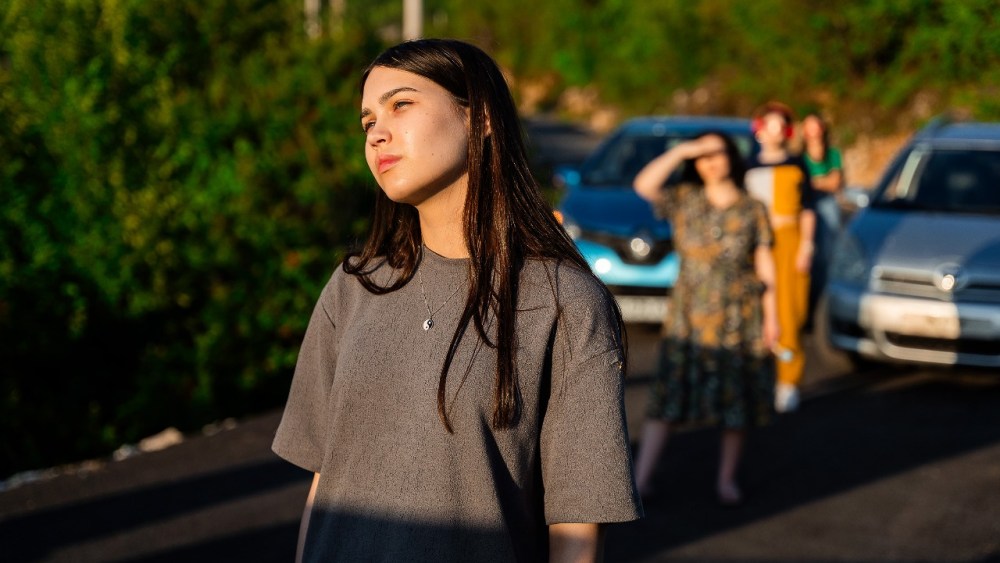In the decade between the late 90s and mid-2000s, Bosnian director Srdan Vuletic helmed several award-winning films such as “Summer in the Golden Valley” and “It’s Hard to Be Nice,” which premiered in major festivals such as Toronto and Berlin. After the latter, the director did not helm a project for 17 years, returning to cinema last year in quite the prolific comeback with “Gym” and now “Otter,” which will have its world premiere at the Sarajevo Film Festival.
The coming-of-age drama is adapted from Stefan Bošković’s (also the film’s scriptwriter) short story and trails Hana (Maša Drašler), a shy 16-year-old who is in love with popular kid Mario (Savin Perišić). On the morning of their first unofficial date, a rare solar eclipse is set to take place, and Hana’s dad dies, starting a chain of events that will see the teenager face not only a flood of unprocessed grief but also great pain at the hands of young boys raised under sexist ideals.
Speaking to Variety ahead of Sarajevo, Vuletic says he was “stuck in movie jail” for the almost two decades that preceded his two last films. “I realized I had to work on different things, and in a different way. It was a really challenging period, but circumstances aligned for all these projects to come around at the same time, and I am really glad to be working again.”
The director adds that some of the issues that kept him away from directing have to do with Bosnia’s film industry itself, with Vuletic saying that he feels politicians have filmmakers “in a state of prolonged euthanasia.”
“It is a very strange situation because if there is one single field where our country is really successful, it is filmmaking,” he continues. “We have an Oscar, we have nominations, we are respected, but we have a big problem in that filmmakers and film workers can’t have an open dialogue with the government. It is something easily solvable.”
Zuletic says there is still a government reluctance to offer state money to filmmaking, a practice widely adopted across Europe. “In Bosnia, even if you get domestic film funds, they are very small and the wait is very long. We want to use the festival to bring this conversation back into focus and have an actual dialogue with the government,” he says, also highlighting that one of the main issues is that Bosnia does not have a film center. “All the other countries of the former Yugoslavia have one. Serbia, Montenegro, and Slovenia all have film centers. It is unbelievable we still don’t have one.”

“Otter” (Courtesy of Sarajevo Film Festival)
This disappointment with the national support offered in his home country made Zuletic all the more appreciative of Montenegro, where he shot “Otter.” The film is a Montenegrin production, with a Montenegrin cast and a largely national crew.
“After shooting the film, I keep telling everyone how Montenegro’s film industry is much healthier than ours in Bosnia,” the director points out. “They may have fewer auteurs, but they have vision and a strategy, which has worked really well over the last decade. In Montenegro, the state and the film fund actually follow your project from an early development stage until distribution, which makes a lot of difference.”
The filmmaker highlights how surprised he was by the level of acting talent in the country, recalling how he expected around 40 boys and girls to audition for the main roles, but ended up having over 300 candidates. “During the auditions, I learned that over a hundred of them were from this organization called Empty Space, where the kids learn not only to act but to dance and play. Montenegro is a country of 600,000 people, and the level of cultural infrastructure that takes the kids away from their cellphones and into art is incredible.”
Zuletic is particularly praiseful when it comes to Drašler, who he says enabled them to shoot the film “exactly the way we wanted it.” Working with non-actors, he adds, was not an issue in “Otter,” and also allowed for the crew and cast to build the level of trust needed to explore sensitive issues such as death and sexual abuse. Following his producer’s advice, Zuletic included the young cast’s parents from the very beginning and made them aware of the movie’s themes.
“Our producer insisted on having psychological support on set, which worked more or less as an intimacy coordinator,” he clarifies. “The parents were also there from the first rehearsals and knew what we were doing, because sometimes when you send a script to the kids, they will not tell the parents the details of the film, and we did not want to get into a situation where we start shooting and parents only then realize and think it is too much for their kid.”
Asked how he’s feeling ahead of the film’s world premiere in his home country, the director says: “Honestly? I’m impatient because I believe we made a very interesting, exciting, and different film, especially for this region. I am now impatient to see how audiences will react and can hardly wait to see people going out of the cinema and hear what they have to say.”
“Otter” is produced by Ivan Đurović of Montenegro’s Artikulacija Film in co-production with Daniele Segre of Italy’s Redibis Film, Katarina Prpić of Croatia’s Izazov 365, Fatmir Spahiju of Kosovo’s Buka Productions, and Ishak Jaliman of Bosnia’s Realstage. The film is supported by the Film Centre of Montenegro, the Ministry of Culture of Italy, the Croatian Audiovisual Centre (HAVC), the Ministry of Culture and Sports of the Sarajevo Canton, the Sarajevo Film Foundation, and the Kosovo Cinematography Center.

